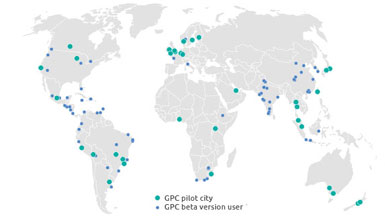Europe’s oil companies surprised everyone when they called for a carbon tax a few weeks ago, but although that’s good news, what they really want is for the world to turn to natural gas as the major climate solution.
Europe’s cities wrote their own letter in response, with the title, "Gas will not save the climate, decentralised energy will."
The letter says the energy transition is well underway, led by the world’s cities, toward distributed, diverse energy sources.
"Although we support the idea of a well-functioning carbon market, we believe the world’s energy would be best used if we stopped focusing on one supposedly salutary source of power, technology or market enabler," the letter says.
All across the world, cities are "creating new production and consumption systems that are not dependent on one source of fossil energy, but a large mix of distributed, sustainable and decentralised ones. Through direct cooperation with citizens, civil society, academics and businesses, cities and regions are encouraging all their territory’s actors to take a stake in the energy transition. In a resource-constrained world, they are spearheading new systems of governance where energy is seen as a common good, not a mere commodity. They view energy as a resource we ought to save, beyond one that we can sell."
They point to the more than 6000 European cities that are on track to cut emissions 28% by 2020, through the Covenant of Mayors – well beyond the EU’s 20% target.
Cities that measure and report greenhouse gas emissions using a standard protocol:

"Big multinational energy companies are seeing their business models threatened by the ongoing push towards more decentralized and distributed energy systems," Claire Roumet, Executive Director of Energy Cities (which represents 1,000 cities in Europe) told Politico.
"From solar, biomass, hydropower, use of heat from wastewater or from industrial processes, combined heat and power … There is an ever-growing list of means to heat and power in our cities. All that is needed is the right political will and some creativity," Eckart Würzner, mayor of Heidelberg, Germany, told Politico.
There are now numerous joint efforts by cities, such as Carbon Neutral Cities Alliance, C40 Cities Climate Leadership Group and the City Energy Project in the US.
Read our articles, 100% Renewable Energy Gaining Traction As Worldwide Goal, which lists cities that have that goal, and World Is Moving to Distributed Energy: 165 GW by 2023.
Don’t Cut Climate From Trade Deal, Says EU
Members of Europe’s parliament wrote their counterparts in the US House, urging them not to pass Fast-Track trade authority without removing the amendment slipped in at the last minute on climate change.
"Our capacity for showing leadership together [on climate] is enormous," they wrote. "Protection of the environment is a major priority for the people of Europe and the European parliament. Ruling out any action to protect the planet from global warming and climate change would deal a major blow to the prospects of reaching agreement on the TTIP which the parliament is due shortly to consider, and which we have been told should become a ‘gold standard’ for international trade agreements."
"As the global community prepares for the UN climate conference in Paris this December we do not believe that it is anyone’s interests to be seeking to limit or restrict the scope for international agreements to help us make progress on addressing global warming and climate change."
If Obama can’t talk trade and climate, "We will be going into these international meetings with our tails between our legs," Congressman Raul Grijalva (D-AZ), told The Guardian.
The European Parliament says it will block the US-EU trade deal (TTIP) and the much bigger one, TISA, unless they uphold climate, health and social laws, they said last week. A leaked draft shows that emissions laws that govern airlines and ships would be outlawed, for example.
"Trade must be about trade, not about constraining democratic choices. We want better international regulation, not lower domestic regulation. We want an upwards leveling of global standards, not a race to the bottom. Our standards are not for sale, they are not trade barriers," they say.
